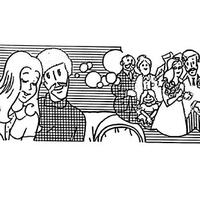Leciono 11. La Familio
Lesson|The|Family
Lektion 11. Die Familie
Lesson 11. The Family
Lección 11. La familia
Leçon 11. La famille
Lezione 11. La Famiglia
Lição 11. A Família
Урок 11. Семья
Leciono 11.
leçon
Lesson
Lesson 11
La Familio
The|The Family
The family
P Sed, kara mia, kion diros viaj gepatroj?
|||||скажут||
|||||diront|tes|tes parents
Punctuation|but|dear|dear|what|will say|your|parents
P But, dear to me, what will your parents say?
P 하지만 얘야, 너의 부모님은 뭐라고 하실까?
Ĉu vi opinias, ke ili kontraŭstaros nian geedziĝon?
|||||противостоят|нашу|свадьбе
|||||s'opposeront||mariage
question particle|you|think|that|they|will oppose|our|marriage
Do you think they will resist our wedding?
그들이 우리의 결혼을 반대할 것이라고 생각합니까?
H Kompreneble ne.
H|Of course|no
H Of course not.
H 당연하지.
Kia ideo!
Какой|
|idée
What|what an idea
What an idea!
좋은 생각이야!
Miaj gepatroj tre ŝatas vin, kaj ankaŭ mia frato.
||||||||frère
my|parents|very|like you|you|and|also|my|brother
My parents are very fond of you, and also my brother.
Mes parents vous aiment beaucoup, ainsi que mon frère.
우리 부모님은 당신을 매우 좋아하고 내 동생도 마찬가지입니다.
P Ĉu vere?
question particle|question particle|really
P Is it really?
Vraiment ?
Q 정말요?
H Jes, certe.
H yes|Yes|certainly
H Yes, of course.
Oui, bien sûr.
H 네, 물론이죠.
Sed kion diros via familio?
|que|||
but|what|will say|your|family
But what will your family say?
Mais que dira ta famille ?
그러나 당신의 가족은 뭐라고 말할까요?
Mi dubas, ĉu mi plaĉas al via fratino.
|сомневаюсь||||||
|doute||||||
I|doubt|whether|I|like|to|your|sister
I doubt if your sister likes me.
Je doute que je plaise à ta sœur.
당신의 여동생이 나를 좋아하는지 의심스럽습니다.
P Kompreneble vi plaĉas al mia fratino.
of course|of course|you|please|to|my|sister
P Of course you like my sister.
Bien sûr que tu plais à ma sœur.
P 물론 내 동생이 당신을 좋아합니다.
Ŝi vere ŝatas vin.
she|really|likes you|you
She really likes you.
그녀는 당신을 정말 좋아합니다.
H Kaj viaj gepatroj?
H (name)|And|your|parents
H and your parents?
Et tes parents ?
H 그리고 부모님은?
Ĉu plaĉos al ili havi bofilinon?
|им понравится|им им|||девушку
|plaira||||une belle-fille
question particle|will it please|to|them|having|girlfriend
Will they have a daughter-in-law?
Est-ce qu'ils aimeront avoir une belle-fille ?
그들은 며느리를 갖는 것을 좋아할까요?
P Tute certe.
P|totally|certainly
P Absolutely sure.
Tout à fait sûr.
P 물론입니다.
Kaj ili estus tre kontentaj esti geavoj.
||||||дедушки и бабушки
||seraient||||grands-parents
And|they|would be|very|happy|would|grandparents
And they would be very happy to be grandparents.
그리고 그들은 조부모가 된 것을 매우 기뻐할 것입니다.
Nepo aŭ nepino tre plaĉus al ili.
племянник||племянник или племянница||нравился бы||
Nepo||fille||||
nephew or niece|or|niece|very|would please|to them|them
Grandson or granddaughter would be very pleased with them.
손자나 손녀는 그들에게 매우 기뻐할 것입니다.
H Estas tro frue por paroli pri idoj, ĉu ne?
|||||||детях||
|||||||enfants||
It|It is|too|too early|to|speak about|about|children|isn't it|not
H It's too early to talk about puppies, right?
H 병아리에 대해 이야기하기에는 너무 이르지 않습니까?
P Jes, vi pravas.
|||avez raison
P (initial)|Yes|you|are right
P Yes, you're right.
Tamen mi deziras infanojn; ĉu ne ankaŭ vi same?
||||||||также
However|I|wish|children|question particle|not|also|you|too
However, I want children; are not you likewise too?
Pourtant, je désire des enfants ; n'en désirez-vous pas aussi ?
그러나 나는 아이들을 원합니다. 너도 그렇지?
H Ho jes, mi tre amas infanojn.
||||||les enfants
Oh|Oh|yes|I|very|love|children
H Oh yes, I love children very much.
Oh oui, j'aime beaucoup les enfants.
P Ĉu vi volas, ke la geedziĝa ceremonio okazas en preĝejo?
||||||свадебная|церемония бракосочетания|||церкви
||||||mariage|cérémonie|||église
question particle|question particle|you|want|that|the|wedding|ceremony|takes place|in a|church
Q Do you want the wedding ceremony to take place in a church?
Voulez-vous que la cérémonie de mariage se déroule dans une église ?
Q 결혼식은 교회에서 하길 원하시나요?
H Certe jes, en preĝejo, kun multaj gastoj - geonkloj, gekuzoj, genevoj - la tuta familio.
|||||||гостями (гостями)||двоюродные братья|двоюродные братья|||
||||||||||||toute|
H family|Certainly|yes|in the|church|with|many|guests|uncles|cousins|cousins|the|the whole|family
H Surely yes, in a church, with many guests - geonchens, cousins, genera - the whole family.
H 물론입니다. 교회에는 삼촌, 사촌, 사촌 등 온 가족이 많은 손님이 있습니다.
P Ni devas decidi la daton de la ceremonio.
|||||дату|||
|||||date|||
we|we|must|decide|the|date|of|the|ceremony
P We must decide the date of the ceremony.
Kiam ĝi estu?
||будет
||soit
when|it|will be
When is it?
언제해야합니까?
H Nu, supozeble, post nia vizito al la kongreso.
||предположительно|||посещение|||конгресс
||sûrement||||||
H (H)|Well|presumably|after|our|visit|to the|the|convention
H Well, presumably, after our visit to the congress.
H 음, 아마도 우리가 의회를 방문한 후일 것입니다.
P Sed kial post ĝi - kial ne antaŭ la kongreso?
|||||||до||
||||elle|||||congrès
P|But|why|after|it|why|not|before|the|the congress
P But why after it - why not before the congress?
Q 그러나 왜 그 이후에 - 의회 전에는 안 되는 이유는 무엇입니까?
Se ni aliĝos al la kongreso kiel geedza paro, la kotizo estos malpli alta.
||присоединимся|||||супружеская|||взнос||менее|
||||||||||||moins|
if|we|will join|to|the|the congress|as a couple|married couple|couple|the|fee|will be|less|fee
If we join the congress as a couple, the fee will be less.
결혼한 부부로 대회에 참가하면 참가비가 낮아집니다.
Ni povos ŝpari.
|можем|сэкономить
we|will be able|save money
We can save.
우리는 저장할 수 있을 것입니다.
H Kia penso!
||какая мысль
||pensée
Oh|What|thought
H What a thought!
H 무슨 생각이야!
Kia homo!
what a|what a person
What kind of man!
Quel homme !
이 얼마나 남자!
P Helena, mia kara, ne koleru.
П|||||разозлись
|||||se fâcher
Dear|Helen|my|dear|don't|get angry
P Helena, my dear, do not be angry.
P Helena, ma chère, ne te fâche pas.
P 헬레나, 화내지 마.
Tio estis nur sugesto.
|||предложение
|||sugestion
that|was|just|suggestion
That was just a suggestion.
C'était juste une suggestion.
그것은 단지 제안이었습니다.
La mono ne gravas.
|||имеет значение
|argent||
The|the monkey|not|matters
The money does not matter.
돈은 중요하지 않습니다.
Temas nur pri tio, ke mi volas edziĝi al vi kiel eble plej baldaŭ.
|||||||жениться||||||
il s'agit|||||||||||||
it's about|only|about|that|that|I|want|get married|to|you|as|as soon as possible|as soon as possible|as soon as possible
It's just about that I want to get married to you as soon as possible.
그저 빨리 당신과 결혼하고 싶다는 것뿐입니다.
H Kara Petro, pardonu min!
Dear|Dear|Peter|forgive|me
H Kara Petro, pardon me!
H 친애하는 Peter, 저를 용서해주세요!

